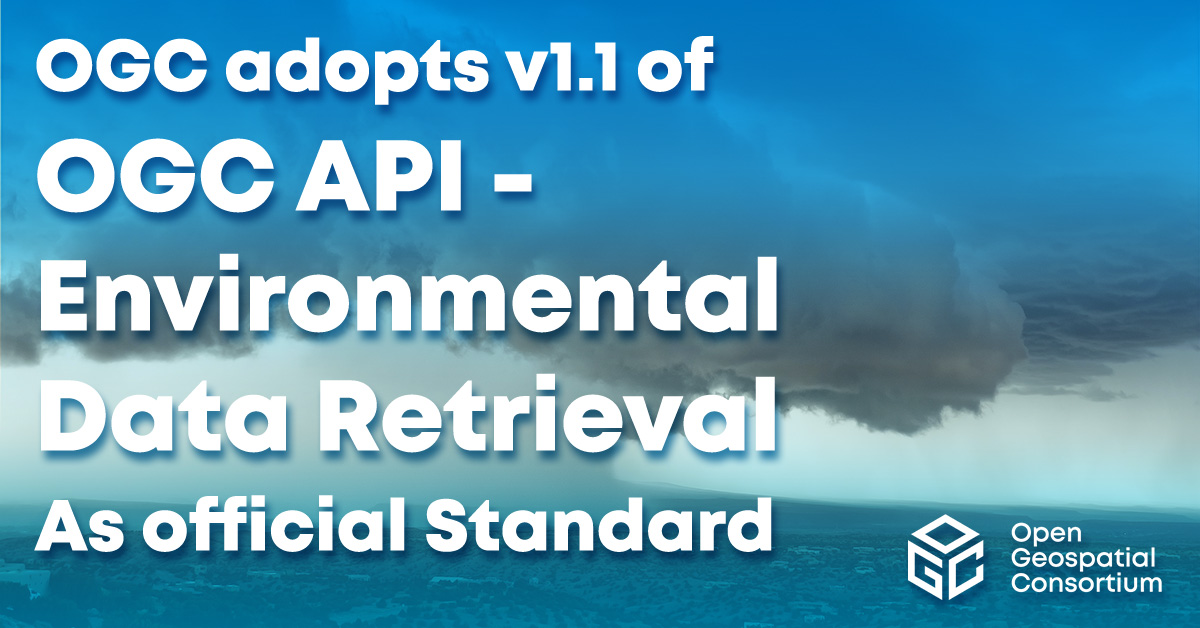The Open Geospatial Consortium (OGC) is excited to announce that version 1.1 of the OGC API – Environmental Data Retrieval (EDR) Standard has been approved by the OGC Membership for adoption as an official Standard.
The Standard is part of the OGC API family of Standards that each help advance OGC’s Mission to make the world’s location information FAIR: Findable, Accessible, Interoperable, and Reusable.
The OGC API – EDR Standard makes it easy to access a wide range of data through a uniform, well-defined, simple Web interface that provides users with purely the data they require while shielding them from the complexities of the underlying data storage technologies.
A major use case for an EDR API is to retrieve small subsets from large collections of environmental data, such as weather forecasts, though many other types of data can be accessed. The important aspect is that the data can be unambiguously specified by spatio-temporal coordinates.
The Standard describes a series of requirements for developing an EDR API, including lightweight query interfaces that allow users to request spatio-temporal data at a specific Position, within a Radius, within a Cube, within an Area, along a Trajectory, or through a Corridor.
Version 1.1 of the Standard offers a number of backwards-compatible enhancements. One major enhancement is support for the HTTP POST method. This enhancement will make it possible to handle requests with large payloads, such as complex filter constraints. Another enhancement is greater flexibility in selecting a default Coordinate Reference System (CRS) to be used when a client application has not indicated a preferred CRS. This enhancement will make it easier to serve data that is referenced to national or regional coordinate reference systems.
The other major enhancement is support for additional custom or categorical dimensions to use in queries in addition to the usual (x,y,z,t) continuous spatio-temporal dimensions. An example use case would be to request data for a specific wavelength or select from a specific waveband. A common meteorological use case would be to query data from a specific forecast from an ensemble of simultaneous forecasts.
The OGC API – EDR Standard supports a full range of use cases: from retrieving time-series observations to sub-setting multi-dimensional data cubes along user-supplied sampling geometries. Such sampling geometries are provided by a client through query patterns that use a set of common parameters. These query patterns provide useful building blocks to allow the composition of APIs that satisfy a wide range of geospatial data use cases. By defining a small set of query patterns, the OGC API – EDR Standard helps to simplify the design of systems, as they can be performance tuned for the supported queries – thus making it easier to build robust and scalable infrastructure.
To help users implement the OGC API – EDR Standard, an OpenAPI definition document and schema definition files have been published, alongside the Standard, on the OGC API – EDR page.
To learn more about how the family of OGC API Standards work together to provide modular “building blocks for location” that address both simple and the most complex use-cases, visit ogcapi.org.
OGC Members interested in staying up to date on further progress of this standard, or contributing to its future development, are encouraged to join the OGC API – EDR Standards Working Group via the OGC Portal. Non-OGC members who would like to know more about participating in this SWG are encouraged to contact the OGC Standards Program.
As with any OGC Standard, the OGC API – Environmental Data Retrieval 1.1 Standard is free to download and implement. Interested parties can view and download the Standard from the OGC API – EDR page.
